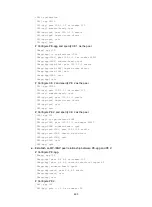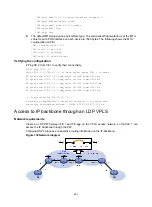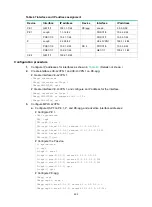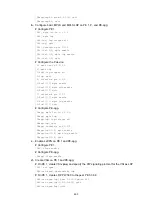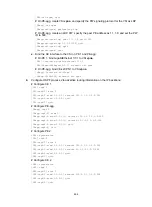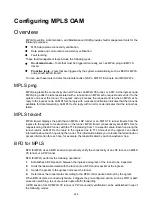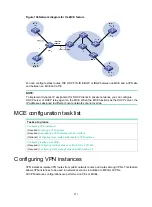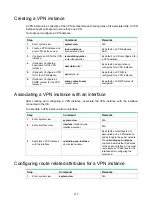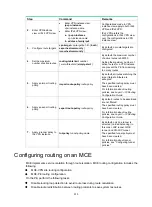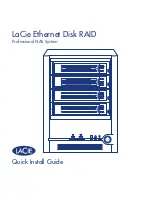
498
Task Command
Use MPLS ping to verify MPLS LSP
connectivity for an IPv4 prefix.
ping mpls
[
-a
source-ip
|
-c
count
|
-exp
exp-value
|
-h
ttl-value
|
-m
wait-time
|
-r
reply-mode
|
-rtos
tos-value
|
-s
packet-size
|
-t
time-out
|
-v
]
*
ipv4
ipv4-address
mask-length
[
destination
start-address
[
end-address
[
address-increment
] ] ]
Configuring MPLS tracert for LSPs
Perform the following task in any view:
Task Command
Use MPLS tracert to trace the LSPs for
an IPv4 prefix.
tracert mpls
[
-a
source-ip
|
-exp
exp-value
|
-h
ttl-value
|
-r
reply-mode
|
-rtos
tos-value
|
-t
time-out
|
-v
|
fec-check
]
*
ipv4
ipv4-address mask-length
[
destination
start-address
[
end-address
[
address-increment
] ] ]
Configuring BFD for LSPs
To configure BFD for an LSP, configure both the local and remote devices as described in
Table 48 Configurations on the local and remote devices
BFD session
establishment
mode
Node type
Execute the "mpls
bfd enable"
command?
Execute the
"mpls bfd"
command?
Configure the
discriminator
keyword?
Static mode
Local Yes
Yes
Yes
Remote Yes
Yes
Yes
Dynamic mode
Local Yes
Yes
No
Remote Yes
No
N/A
Follow these guidelines to configure BFD for an LSP tunnel:
•
To establish a static BFD session, ensure that the local and remote discriminators configured
locally are identical with the remote and local discriminators configured on the remote device,
respectively.
•
The source address of the BFD session is the MPLS LSR ID of the local device. Before
configuring BFD for the LSP tunnel, perform the following tasks:
a.
Configure an MPLS LSR ID for the local device.
b.
Make sure a route is available on the remote device to reach the MPLS LSR ID.
•
If multiple LSPs exist for an FEC, you can perform one of the following tasks:
{
Create a BFD session for an LSP by specifying the next hop of the LSP.
This configuration is not available for nested LSP connectivity verification.
{
Create a BFD session for each LSP without specifying a next hop.
•
On a BFD session established in static mode, the ingress node and egress node both operate
in active mode. On a BFD session established in dynamic mode, the egress node operates in
active mode and the ingress node operates in passive mode. Executing the
bfd session
init-mode
command on the ingress or egress node does not change the node's operating
mode.







